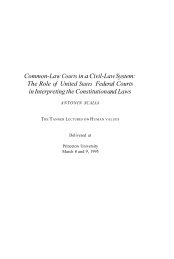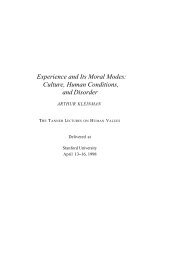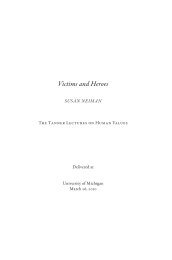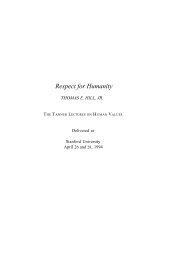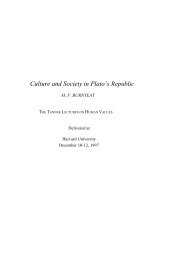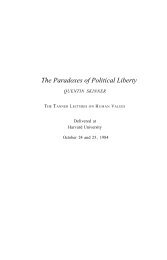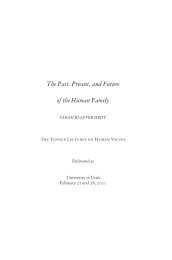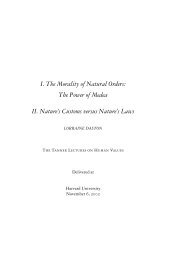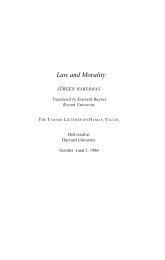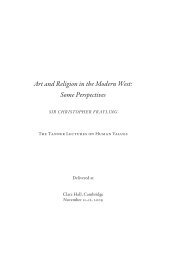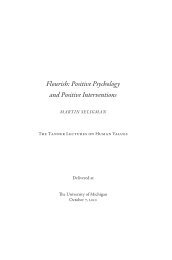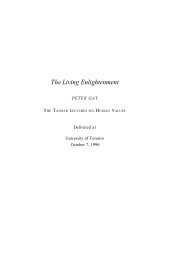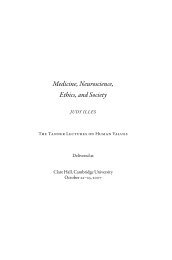Muguerza, Javier - The Tanner Lectures on Human Values
Muguerza, Javier - The Tanner Lectures on Human Values
Muguerza, Javier - The Tanner Lectures on Human Values
You also want an ePaper? Increase the reach of your titles
YUMPU automatically turns print PDFs into web optimized ePapers that Google loves.
120 <str<strong>on</strong>g>The</str<strong>on</strong>g> <str<strong>on</strong>g>Tanner</str<strong>on</strong>g> <str<strong>on</strong>g>Lectures</str<strong>on</strong>g> <strong>on</strong> <strong>Human</strong> <strong>Values</strong>Perhaps today it is difficult to accept the idea that the moral subjectand the empirical subject do not entirely coincide, but theimpossibility of reducing the subject to its manifest properties wasat least part of what the Greeks meant when they termed the subjecthypokeimen<strong>on</strong>. 97<str<strong>on</strong>g>The</str<strong>on</strong>g> moral subject exemplifies par excellencethe subject understood in this way, and this is also the reas<strong>on</strong> forthe distance separating the moral subject from the so-called “subjectof rights” (sujeto de derechos), which is, am<strong>on</strong>g others, avariety of the empirical subject. For the rest, not all subjects ofrights are moral subjects, since a moral subject is always an individual,while the subjects of rights might well be “impers<strong>on</strong>alsubjects,” such as collective bodies or instituti<strong>on</strong>s, from a businessall the way to the state itself. And even when, by analogy withmoral subjects, we allow <strong>on</strong>e of these impers<strong>on</strong>al subjects such asa social class or a nati<strong>on</strong> the capacity for “self-c<strong>on</strong>sciousness” andfor “self-determinati<strong>on</strong>,” we must not forget that in any case bothdepend <strong>on</strong> the self-c<strong>on</strong>sciousness and self-determinati<strong>on</strong> of thecorresp<strong>on</strong>ding individuals. Now then, moral subjects can, and infact do, aspire to recogniti<strong>on</strong> as subjects of rights. And of thoseaspirati<strong>on</strong>s <strong>on</strong>e of the most fundamental is the aspirati<strong>on</strong> to recogniti<strong>on</strong>as “subjects of human rights.” In a certain sense, this wouldbe the first human right and even the quintessence of any otherhuman right; in other words, the right to be a subject of rights.But to the questi<strong>on</strong> of who or what would c<strong>on</strong>cede them thisright, prior to any possible recogniti<strong>on</strong> of rights, I would answerthat nothing and no <strong>on</strong>e has to c<strong>on</strong>cede it to a moral subject infull command of his faculties but that it must be the subject him-“morality” as a necessary c<strong>on</strong>diti<strong>on</strong> for the “(practical) identity of the self.” Forsuch an interpretati<strong>on</strong> of Kant’s idea of man as “an end in himself,” see my“Habermas en el reino, de losfines,” 123ff.97 In a somewhat similar vein, Tugendhat speaks of a pers<strong>on</strong>’s “being <strong>on</strong>eself”(Selbstsein), which he identifies with <strong>on</strong>e’s “existence” (Existenz), as a “quasiproperty”( Quasi-Eigenschaft), which according to him has to do - rather thanwith a substantial property that is different from the accidental <strong>on</strong>es -with theKantian noti<strong>on</strong> of “end in itself.”



